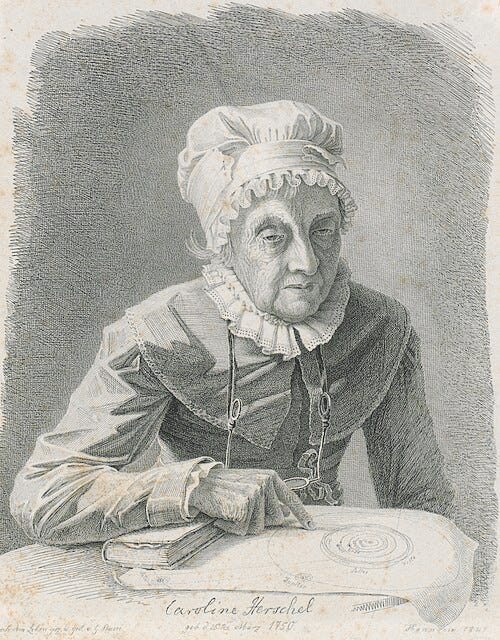The stars were for men to study and name. That was simply the norm for society at the time.
Then, Caroline Herschel came along. And norms changed. However, even more significantly, Caroline's work with her brother would lead to a profound change in the field of astronomy.
She stood small in stature, barely four feet three, with a back hunched from a bout with typhus that nearly took her life at the age of ten and then stunted her growth. Caroline later wrote that the illness “reduced my strength to that degree that for several months after I was obliged to mount the stairs on my hands and feet like an infant.”
But she did survive. And then followed the path laid out by her mother, who believed that a woman’s place was in the home. That belief wasn’t unusual for mid-18th century Germany, where Caroline was born in 1750, the eighth of ten children in the town of Hanover. But her mother was particularly stern. Because of Caroline’s stunted growth and the damage left by illness, and because the family wasn't rich, Her parents both believed their daughter wouldn’t marry and thus wouldn’t live independently. Unmarried women typically lived with their parents at the time.
So Caroline became the housemaid. For years, she scrubbed floors, cooked meals, and hemmed her brothers’ shirts. She had some formal education, but her dreams of becoming a governess weren't possible because Caroline hadn't been allowed to learn French. That alone closed the door.
Yet Caroline did have a number of talents. The Herschel household centered around music and curiosity. Her father played the oboe in the military band and had a passion for astronomy. Time at the family home often included intellectual conversation and music, especially when her brothers, including William, were present. Caroline remembered these nights vividly in her memoir:
Keep reading with a 7-day free trial
Subscribe to Historical Snapshots to keep reading this post and get 7 days of free access to the full post archives.




